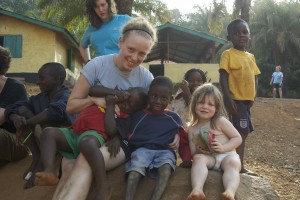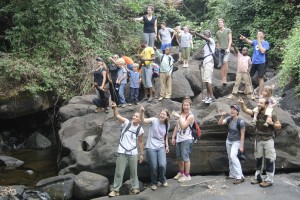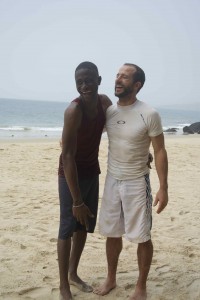In the cool of the morning (a mere 27C/81F), I like to run up the road that the Chinese are building to connect Hill Station, Freetown, with the eastern part of the peninsula. As dawn breaks, I can make out the hundreds of workers walking up the road towards me and another day’s road construction. Labour is cheap (minimum wage is about $2/day) so men, and even whole families, can be seen using hammers to make gravel out of the piles of rocks. Covered with the ever present red dust, cries of “Pastor Michael”, “Mr Michael”, “Well done”, “Thank you” and, rather bizarrely I think, “White boy”, usually follow my progress. Occasionally I feel almost compelled to stop, point to my beard and say “white man, white man!”
Often in the morning we go to the old people’s home that is next door to where we live. During my first visit, I saw in a corner of one of the rooms, an old man, hunched over, with a long white beard that hid his semi-naked and sore covered body. He was sitting on a filthy bed surrounded by cock-roaches that scuttled in and out of what possessions he owned; there was nothing in me that wanted to go over to speak with him. “He probably doesn’t even speak English”, I reasoned – which would have provided me with an easy way out. Forcing myself to engage, I discovered that not only had he spent time working in England, but he was also fluent in Russian and German (from his time at Hidelburg University where he studied medicine) and a fascinating half hour of discussion ensued. Having gone blind four years previously, his enforced solitude is now rarely broken – he was overjoyed to find people that wanted to talk with him, particularly with Janis, our German team member. Things are rarely what they seem.

Our dining area and the classroom at St George’s are in the background.
At the other end of the appearances spectrum, we had a visit from the US Embassy, including the ambassador. They’ve been visiting St George for the last couple of years, and this time they kindly brought presents for all of the children and also brought them some “western food” as a treat. As we watched them eat food, that we would have dearly loved to have had a bite of (I’m fairly certain some of us were actually drooling), it was tragic/comic to watch the children quietly take the potato salad they had been given, pass it from plate to plate along the line, before the last person dumped it over the wall. If we’d thought more quickly, I’m sure that one of us could have been on the other side with a plate to catch it. Likewise, pop-tarts, brownies and peanut-butter cookies were crumbled up and left on plates, or brushed on to the floor. Later, when the Americans had left, we had fish-head and potato leaf soup with rice, as this time the children looked on enviously at us and at least one or two of us would have liked to have dumped it over the wall. Truth be told, once we got over our squeamishness (those doing dinner prep have been known to find maggots in the fish), most of us have enjoyed the food, but it has been a bit of a stretch – not least because the spice would make an Indian break out in a sweat.
On the subject of food, we spent a day with my brother who is working here in Sierra Leone. Our children gratefully gobbled up every bit of Western style food in sight and gorged themselves on fizzy drinks. It was as they sat down to a spam sandwich and declared it the best food that they had ever eaten, that I realised that perhaps they’ve been struggling a bit more with the food than I had given them credit for.
During the fist week, we spent an afternoon in Freetown. As we headed back to our poda-poda (mini-van), a girl dropped all of the groundnuts she was selling across one of the main roads in Freetown. Distraught, she froze, too scared to go out in front of the cars, but she couldn’t bare just to leave her day’s work to be crushed by the traffic. As people stood and stared, Hannah (one of our team members) rushed out into the traffic, brought the cars to a standstill and started to pick up the girl’s precious cargo. Merecedes, Land Crusiers and poda-podas all had to wait, as this white girl blocked their way. The drivers got out of their cars, gesturing and talking loudly, but by then the team were on their hands and knees salvaging all that they could. Bystanders and people coming out of the shops watched with their mouths open before breaking into smiles at this curious and unusual sight; a few even joined us on hands and knees. Only a few of the girl’s precious groundnuts could be saved, but it is an image that I will never forget.
Almost every evening, you can find our team playing football with the boys from the centre (and various local boys who now join us), on a dirt/gravel/rock pitch. If you are close to the hill, it is a little like playing on marbles, where even the slightest change of direction, will find you sprawling on the ground. We have all skinned knees and elbows, but somehow the boys not only manage to stay upright, but show skill that we couldn’t manage on the best of pitches. Our only chance is to run fast and straight. The other side of the improvised football pitch drops precipitously down to the road that the Chinese are building – at least it is clear where the boundaries are.
Night falls. We had the opportunity to walk the streets of Freetown between mid-night and 5am. Just metres away from State House, and overlooked by the tallest building in Freetown, is a large bombed out, but partially restored building. During the day, it is a thriving retail centre with dozens of tiny shops that open out onto the teeming streets. But as night falls, the shops are stripped bare and all of the goods transported away for storage over night. Then a very different sort of trade begins. In the centre of the building is a bar/night club, and the rooms that were full just hours before with groundnuts, chillies, Ovaltine, biscuits (cookies), and every “made in China” plastic thing that you can think of, become “hotel” rooms. Typical of the women who work there was Jerriatu, who had been working that area for 23 years – since she was ten. As she explained, most of these women support families and so can rarely be persuaded to come off the streets – how else will they and their families survive?

On a hike with some of the older boys from St George’s. We were pointing to a boa constrictor that was in the tree.
And then there are the street boys, who were the ones that we had come to find – not a difficult task as there are hundreds, if not thousands, of them. As soon as we stepped out of the vehicle I caught sight of movement out of the corner of my eye. A young boy dropped down to street level from the narrow ledge of a four story building that he had been sleeping on. Looking more closely, I could see several more horizontal figures, sleeping fifteen feet up in the air on a ledge not more than two feet wide. Later that night I met Cam and his Rasta boys, including a blind bass player who played Sierra Leone reggae for me. They all lived on the streets, but dreamed of music transporting them to a better life. They warily eyed the police as they drove by, but knew that they were safe as long as the “Poto’s” (white people) were around. We were there, partly to see what it was like on the streets, but also to let the boys know about the work of St George’s, where we live. Four of the boys we met that night said they wanted to be reunited with their families. Their reasons for being on the street were tragic, but also sometimes seemingly absurdly minor – one had stollen 40,000 Leones (less than $10) from his family two years earlier so that he could travel to Freetown, and was now afraid to go back because of the potential consequences. The next day, Abraham, one of the boys we had spoken to, walked up to our dining area. He had started walking at noon and didn’t get here until 6:00pm, with broken flip flops, and not knowing the way, other than the fact that we were near Grafton. He happened upon one of the St George’s boys when he reached Grafton, and was able to walk with him. Two more boys showed up the next day, but after looking around (and eating an enormous meal), they made their excuses and started the long trek back to Freetown, promising to come back. But this is a good time of year (relatively) to be on the streets, and most of the boys are happy to smoke their drugs, avoid the police and sleep rough. When the rainy season comes, things get much worse and they are more likely to want to leave. Three weeks later and Abrahim is still with us, the other boys have not come back. Soon St George’s will trace Abrahim’s family and begin the process of reintegrating him with his family.

A day off at the beach, with Eddie who runs the centre
No day is ever the same, but as our time here draws to a close, we are grateful for each and every one of them.
Michael Green
